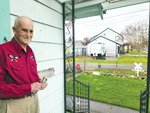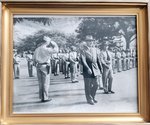

A Centralia nonagenarian recently shared with me a thin book his childhood friend published last year about his Army years during the Korean War, “The Lost Two Years: an autobiography” by Fred L. Holland.
Holland, who lives in Grandview, Washington, wrote about firing M18s — 57 mm shoulder-rifled, anti-tank recoilless rifles — along the main line of resistance toward the end of the Korean War, including in battles for Eerie Hill and Pork Chop Hill. Back at Fort Lewis, his platoon was among a group of soldiers marching in front of bleachers in the Audie Murphy movie, “To Hell and Back.”
But for Robert John McInnis, a railroad retiree who has lived in Centralia more than 60 years, service as a Marine during the Korean War proved quite different.
McInnis, 90, was born in Cosmopolis in November 1931 and grew up in Grays Harbor County’s oldest city, a town named in 1853 for “city of the world” and incorporated in 1891. His father, Matthew McInnis, worked as a carrier driver for a lumber mill in 1940, rented a home for $23 a month, and earned $850 a year, according to census records. He was a jack-of-all-trades who worked as a logger and moved his family a lot.
“The longest we ever stayed in one place was four years,” said McInnis, who has two younger sisters now in their 80s. “I hated it.”
His mother, Alta (Fishel) McInnis, worked as a telephone operator during World War II.
“My parents both worked,” he recalled. “I was constantly going as a little tyke to a cold house.”
After his first two years of school in Wishkah, a Chehalis word for “stinking water,” he attended classes in Cosmopolis and junior high in Quinault.
McInnis had just turned 10 when the Japanese bombed Pearl Harbor Dec. 7, 1941. He knew about Hawaii because, as a child, he used to listen to a radio broadcast from Waikiki Beach, “Hawaii Calls,” that described the island paradise and featured authentic musicians and singers performing native songs in English.
“So I thought it was right next door to heaven,” he said.
McInnis learned to work at a young age. His first job was mowing lawns with a push mower. After school during junior high, when his father was logging trees on his grandfather E.E. Fishel’s homestead, he hopped off the bus at a store, ran a quarter mile to his father’s parked truck, changed clothes and helped his dad fall timber and yard logs using an old Fortson donkey engine. While he was at school, his father cut them into lengths and loaded them onto trucks.
He attended Weatherwax High School in Aberdeen, named for John M. Weatherwax, a New York native and early lumber mill owner, real estate developer and philanthropist.
During his junior year, he earned 50 cents an hour at a tire recut shop in Cosmopolis, repairing tires on about six lumber and logging trucks. “They always had a flat tire,” he said.
Every morning at about 7:30, he’d catch the city bus from Cosmopolis to the high school in Aberdeen, attend classes, ride a bus home, change clothes and report for work by 4:10 p.m. He’d work until midnight — sometimes even 1 a.m. — go home, shower, crawl into bed and start the routine again the next day.
But his hectic schedule caught up with him, usually in his sixth period U.S. history class taught by William Mapes, a shell-shocked World War II veteran who jumped at loud noises. Some students delighted in making him jump, which was cruel.
“Apparently, I snore — very loud,” he said.
When Mapes told him to stay after class, he said, “I have to be on that bus at 3:30.”
“Not today, you’re not,” he said. “Why is it so important you can’t miss the bus today?”
After McInnis outlined his six-day-a-week schedule, the teacher said, “Bobby, you go ahead and sleep in my class.”
While he was working one Saturday in May 1949, two Marines sauntered into the shop and asked if he’d ever thought of joining the Marine Corps Reserves. He’d had two McInnis cousins who served as Marines during World War II.
“I probably spent all told maybe 10 minutes with them,” he said. “It sounded like a good deal.”
Knowing he was likely to be drafted anyway, he joined the Marine Corps Reserves at 17 for two years. In August, he left for Camp Pendleton in Oceanside, California, for two weeks of training. They sent him back on a DC-3 paratrooper plane — the first time he’d ever flown in an airplane — which landed at the Moon Island Airport, officially known as Bowerman Airport or Bowerman Field, outside of Hoquiam. On Mondays during his senior year, he attended a Marine Corps Reserve meeting.
He finished his senior year, graduating from Weatherwax High School in 1950. Before commencement exercises, he said, “I got my notification that we were being activated.”
The Korean War broke out June 25, 1950, when 75,000 North Korean Communist soldiers crossed the 38th parallel to invade the Republic of Korea in the south. McInnis and fellow Marines boarded a Pan American Stratocruiser at a base near Sacramento, figuring they would be sent to Korea. Instead, the captain announced over San Francisco Bay that the plane was headed for Pearl Harbor in Hawaii.
“I spent the only time I was ever in jail,” he said. “For the first week when we got there, they didn’t know what to do with us. So I went to the Marine Corps brig.”
They spent the week in the brig, behind bars and gates but free to come and go, until they received their assignments.
He and a fellow from Toledo, Ohio, Glenn Horn, were stationed together at the main gate of the U.S. Navy base at Pearl Harbor.
“Our duty was protecting the naval base,” he said. “We became like brothers.”
In fact, they married within weeks of each other and celebrated their 25th anniversaries together on Oahu during a two-week trip to Hawaii. His friend died of kidney disease in January 2017.
McInnis said he received overseas pay while serving in Hawaii, which at the time was a U.S. territory. It became a state Aug. 21, 1959.
He also pulled guard duty when big brass from the Navy, Marine Corps, Army and Air Force gathered. Standing guard on a second-floor deck, he recalled, “You could look through the windows and there was this giant map of the whole South Pacific. And there were little, tiny ships on the map, and they were constantly moving them. I don’t know if they were all our ships, or if they were enemy ships, or a combination. You don’t ask questions.”
Later, he was transferred to a communications center for the South Pacific in the middle of the island of Oahu for a few months and then returned to Pearl Harbor.
When a watchman in charge of the barracks was transferred Stateside, McInnis took over his job. He called the roll in the morning for the entire company and then did police duty to clean everything up for inspections. “After that, I had pretty much a free day,” he said.
He was serving in Hawaii when President Harry Truman met with General Douglas MacArthur, commander of the United Nations forces in Korea, on Wake Island Oct. 15, 1950. Truman gave MacArthur his fourth oak leaf cluster on his Distinguished Service Medal, and they talked about the progress of the Korean War. The two leaders differed on how to proceed, as the general wanted to attack China, but the president worried such an attack would draw the Soviet Union into the fight. After MacArthur publicly criticized Truman, the president relieved him of command April 11, 1951.
As the Korean War wound down, McInnis prepared to return home in 1951. But then President Truman signed an order extending military duty by one year.
“So I missed it by a week,” he said. “I did not serve the whole year because they were on the economy move and they wanted to get rid of us, so I was released early.”
He traveled five or six days from Hawaii aboard a Merchant Marine transport ship to San Francisco and then by train to San Diego, where he was released after three or four days of processing. He flew from San Diego to SeaTac Airport in early February 1952.
“The minute I got off the plane, I froze,” he said. “I was used to 85- or 90-degree weather in Hawaii. It didn’t get any better until that summer.”
The first thing he did after greeting his parents? “I saw my girlfriend.”
I’ll share more of his story next week.
•••
Julie McDonald, a personal historian from Toledo, may be reached at memoirs@chaptersoflife.com.